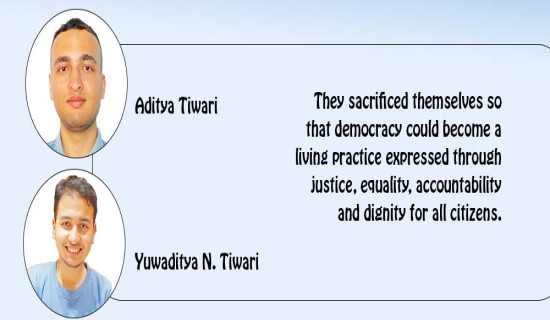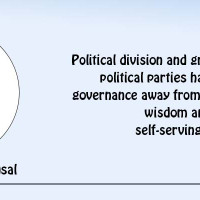- Friday, 30 January 2026
Pay Heed To Doctors In Distress
Medicines cure diseases but only doctors can cure patients’, said Carl Gustav Yung, famous psychologist and psychiatrist. Doctors are believed to be ‘gods in disguise’, given their role in saving the lives of countless patients through medical intervention who would have died otherwise. This has led this profession to be, arguably, the most respected profession in the world. In recent years, Nepal has witnessed frequent attacks on doctors, mostly citing to doctors’ failure to save patients’ lives. This year, the month of September alone has witnessed more than half a dozen attacks on doctors including in Makwanpur, Kanchanpur, Lamjung and Pokhara districts which made extenisve news in media. But the scenario forces us to speculate that there is the possibility of many unreported assaults than actually have come out.
The incidents sparked nationwide fury in medical professionals and even led them to streets from hospital wards. Doctors, always known for saving others’ lives, protested to save their own lives. These incidents, if not well addressed, will have long lasting bruise in country’s health sector. Trust is another name for doctors. According to a survey conducted in 2021, doctors are the most trusted professionals in the world. There is hard labour of doctors to earn this trust. They undergo extensive education and trainings for years to acquire knowledge and expertise for the treatment of patients. Once a patient is on the lap of doctors, what else you feel? Just pray and trust. A sound health system functions only when better trust in doctors is established. The system demands sound legal, institutional and physical infrastructures along with sound human capital including doctors.
Shortage of human resources
Nepal’s recent scenario of attack on doctors necessitates to reexamine the functioning of existing machinery of health system. There is a famous saying of Florence Nightingale, “The first requirement in a hospital is that it should do no harm to patients.” Most of the government health institutions lack sufficient infrastructures and human resource, including doctors. The remote parts of the nation suffer the most in this regard. There is the shortage of human resources even in the government hospitals of city areas. Poor infrastructure, insufficient human resource and a huge number of patients to serve lead, sometimes, to unwanted circumstances. Only sound infratructures can create conducive environment to work and serve. Our expectations from doctors is always of optimum level whereas our health sector still has a big room for improvement for its effective functioning. Therefore, this is a systemic problem rather than the problem created by doctors alone. Health professionals should not pay the price of weaknesses of health system in Nepal. It is essential to raise the morale of doctors and ensure them that they are fully secure for the medical practices in Nepal.
It is not to say that doctors always are in their optimum level with patients and they are not flawless. There are complaints regarding the behaviour and negligence from the side of some doctors as well. Such complaints can be well observed, not in reports, but in the voice of patients and their kin in hospital arena. Health professionals also need to finetune their behaviour to relieve the ailing patients. A soothing word from a doctor can have miraculous impact on patients. In addition, there are complaints regarding private hospitals’ inclination towards earning more money at the cost of vulnurability of patients. But there is a legal remedy for everything, including if medical professionals are found to be culpable. Searching solutions through assaults and vandalism is the backtrodden journey to barbarism. Without any ifs and buts, such acts should be immediately brought to justice.
In 2022, with the increasing incidents of assault on doctors and vandalism at health institutions, the government amended the Security of Health Workers and Health Organisations Act, 2009, thereby provisioning some stringent legal measures including the imprisonment up to five years and fine upto five hundred thousand rupees. But the frequent assault incidents imply that the general public and stakeholders are not well aware of the legal provison. Health workers are demanding the implementation of the Act in its true spirit. About a week ago, Ministry of Home Affairs issued a notice for all stakeholders regarding the legal provisions and sentences to be incurred if the provisions are violated. Law implementation with demonstrative effect can have positive impact and deter offender from such heinous assaults.
Another important, but less talked about aspect is the negativity that has been growing vehemently in the general public. The burgeoning social media activism has further fueled fire of negativity. It seems people’s rising expectations in the nation has turned into rising frustrations. Perpetual political transitions could not breed economic, social and individual wellbeing, neither could it ensure the glimpses of hope in general public. Unfortunately, ‘Nothing-happens-in-Nepal’ rhetoric has been created. Important human values, including trust, honesty, selflessness and impartiality, have been overshadowed by the rising tide of frustrations and negativity. Such social mentality is also adding fuel to offenders to commit such crimes.
Multifaceted impacts
The assaults on medical professionals can have multifaceted impacts on Nepal’s human resource sustainability. If not addressed well, the recent scenario can further escalate frustrations in doctors and medical personnels. The country, which is already suffering more because of high brain drain, can not sustain the suffering of doctors. The ‘gods in disguise’ can not bear the pain if they are unnecessarily projected as ‘devils in disguise’. Immediate solution for this is the enactment of law in its true spirit. For the long-term solution, Nepal’s health sector should emerge as a vibrant sector through policy and strategic interventions in all tiers of government.
Finally, there are hospitals to increase the longevity of life, not to conquer the death itself. Death is the inevitable truth of life. There is nobody immortal on earth in blood and flesh. If doctors could save everyone’s life, why are doctors themselves mortal? They could have first used their ‘miracle’ on themselves and lived forever. There are various factors of death of patients in hospitals including the nature of severity of illness in patients. Identifying such factors can lead to the root cause of problem. And, the solution should be legal recourse, rather than vandalism. Assault on medical professionals is eternally deplorable!
(The author is an Under Secretary of Government of Nepal. @hsharmapoudel)

















